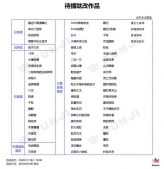我给大家带来的是 50行代码,生成一张素描图。让自己也是一个素描“大师”。那废话不多说,我们直接先来看看效果吧。

上图的右边就是我们的效果,那具体有哪些步骤呢?
1. 流程分析

对于上面的流程来说是非常简单的,接下来我们来看看具体的实现。
2. 具体实现
安装所需要的库:
|
1
|
pip install opencv-python |
导入所需要的库:
|
1
|
import cv2 |
编写主体代码也是非常的简单的,代码如下:
|
1
2
3
4
5
6
7
8
|
import cv2src = 'images/image_1.jpg'image_rgb = cv2.imread(src)image_gray = cv2.cvtcolor(image_rgb, cv2.color_bgr2gray)image_blur = cv2.gaussianblur(image_gray, ksize=(21, 21), sigmax=0, sigmay=0)image_blend = cv2.divide(image_gray, image_blur, scale=255)cv2.imwrite('result.jpg', image_blend) |
那上面的代码其实并不难,那接下来为了让小伙伴们能更好的理解,我编写了如下代码:
|
1
2
3
4
5
6
7
8
9
10
11
12
13
14
15
16
17
18
19
20
21
22
23
24
25
26
27
28
29
30
|
"""project = 'code', file_name = 'study.py', author = 'ai悦创'time = '2020/5/19 8:35', product_name = pycharm, 公众号:ai悦创code is far away from bugs with the god animal protecting i love animals. they taste delicious."""import cv2# 原图路径src = 'images/image_1.jpg'# 读取图片image_rgb = cv2.imread(src)# cv2.imshow('rgb', image_rgb) # 原图# cv2.waitkey(0)# exit()image_gray = cv2.cvtcolor(image_rgb, cv2.color_bgr2gray)# cv2.imshow('gray', image_gray) # 灰度图# cv2.waitkey(0)# exit()image_bulr = cv2.gaussianblur(image_gray, ksize=(21, 21), sigmax=0, sigmay=0)cv2.imshow('image_blur', image_bulr) # 高斯虚化cv2.waitkey(0)exit()# divide: 提取两张差别较大的线条和内容image_blend = cv2.divide(image_gray, image_bulr, scale=255)# cv2.imshow('image_blend', image_blend) # 素描cv2.waitkey(0)# cv2.imwrite('result1.jpg', image_blend) |
那上面的代码,我们是在原有的基础上添加了,一些实时展示的代码,来方便同学们理解。
其实有同学会问,我用软件不就可以直接生成素描图吗?
那程序的好处是什么?
程序的好处就是如果你的图片量多的话,这个时候使用程序批量生成也是非常方便高效的。
这样我们的就完成,把小姐姐的图片变成了素描,skr~。
3. 百度图片爬虫+生成素描图
不过,这还不是我们的海量图片,为了达到海量这个词呢,我写了一个百度图片爬虫,不过本文不是教如何写爬虫代码的,这里我就直接放出爬虫代码,符和软件工程规范:
|
1
2
3
4
5
6
7
8
9
10
11
12
13
14
15
16
17
18
19
20
21
22
23
24
25
26
27
28
29
30
31
32
33
34
35
36
37
38
39
40
41
42
43
44
45
46
47
48
49
50
51
52
53
54
55
56
57
58
59
60
61
62
63
64
65
66
67
68
69
70
71
72
73
74
75
76
77
78
79
80
81
82
83
84
85
86
87
88
89
90
91
92
93
94
95
96
97
98
99
100
101
102
103
104
105
106
107
108
109
110
111
112
113
114
115
116
117
118
119
120
121
122
123
124
125
126
127
128
129
130
131
132
133
134
135
136
137
138
139
140
141
142
143
144
145
146
147
148
149
150
151
152
153
154
155
156
|
# crawler.spider.pyimport reimport osimport timeimport collectionsfrom collections import namedtupleimport requestsfrom concurrent import futuresfrom tqdm import tqdmfrom enum import enumbase_url = 'https://image.baidu.com/search/acjson?tn=resultjson_com&ipn=rj&ct=201326592&is=&fp=result&queryword={keyword}&cl=2&lm=-1&ie=utf-8&oe=utf-8&adpicid=&st=-1&z=&ic=&hd=&latest=©right=&word={keyword}&s=&se=&tab=&width=&height=&face=0&istype=2&qc=&nc=1&fr=&expermode=&force=&pn={page}&rn=30&gsm=&1568638554041='headers = { 'referer': 'http://image.baidu.com/search/index?tn=baiduimage&ipn=r&ct=201326592&cl=2&lm=-1&st=-1&fr=&sf=1&fmq=1567133149621_r&pv=&ic=0&nc=1&z=0&hd=0&latest=0©right=0&se=1&showtab=0&fb=0&width=&height=&face=0&istype=2&ie=utf-8&sid=&word=%e5%a3%81%e7%ba%b8', 'user-agent': 'mozilla/5.0 (windows nt 10.0; win64; x64) applewebkit/537.36 (khtml, like gecko) chrome/75.0.3770.100 safari/537.36', 'x-requested-with': 'xmlhttprequest', }class baiduspider: def __init__(self, max_works, images_type): self.max_works = max_works self.httpstatus = enum('status', ['ok', 'not_found', 'error']) self.result = namedtuple('result', 'status data') self.session = requests.session() self.img_type = images_type self.img_num = none self.headers = headers self.index = 1 def get_img(self, img_url): res = self.session.get(img_url) if res.status_code != 200: res.raise_for_status() return res.content def download_one(self, img_url, verbose): try: image = self.get_img(img_url) except requests.exceptions.httperror as e: res = e.response if res.status_code == 404: status = self.httpstatus.not_found msg = 'not_found' else: raise else: self.save_img(self.img_type, image) status = self.httpstatus.ok msg = 'ok' if verbose: print(img_url, msg) return self.result(status, msg) def get_img_url(self): urls = [base_url.format(keyword=self.img_type, page=page) for page in self.img_num] for url in urls: res = self.session.get(url, headers=self.headers) if res.status_code == 200: img_list = re.findall(r'"thumburl":"(.*?)"', res.text) # 返回出图片地址,配合其他函数运行 yield {img_url for img_url in img_list} elif res.status_code == 404: print('-----访问失败,找不到资源-----') yield none elif res.status_code == 403: print('*****访问失败,服务器拒绝访问*****') yield none else: print('>>> 网络连接失败 <<<') yield none def download_many(self, img_url_set, verbose=false): if img_url_set: counter = collections.counter() with futures.threadpoolexecutor(self.max_works) as executor: to_do_map = {} for img in img_url_set: future = executor.submit(self.download_one, img, verbose) to_do_map[future] = img done_iter = futures.as_completed(to_do_map) if not verbose: done_iter = tqdm(done_iter, total=len(img_url_set)) for future in done_iter: try: res = future.result() except requests.exceptions.httperror as e: error_msg = 'http error {res.status_code} - {res.reason}' error_msg = error_msg.format(res=e.response) except requests.exceptions.connectionerror: error_msg = 'connectionerror error' else: error_msg = '' status = res.status if error_msg: status = self.httpstatus.error counter[status] += 1 if verbose and error_msg: img = to_do_map[future] print('***error for {} : {}'.format(img, error_msg)) return counter else: pass def save_img(self, img_type, image): with open('{}/{}.jpg'.format(img_type, self.index), 'wb') as f: f.write(image) self.index += 1 def what_want2download(self): # self.img_type = input('请输入你想下载的图片类型,什么都可以哦~ >>> ') try: os.mkdir(self.img_type) except fileexistserror: pass img_num = input('请输入要下载的数量(1位数代表30张,列如输入1就是下载30张,2就是60张):>>> ') while true: if img_num.isdigit(): img_num = int(img_num) * 30 self.img_num = range(30, img_num + 1, 30) break else: img_num = input('输入错误,请重新输入要下载的数量>>> ') def main(self): # 获取图片类型和下载的数量 total_counter = {} self.what_want2download() for img_url_set in self.get_img_url(): if img_url_set: counter = self.download_many(img_url_set, false) for key in counter: if key in total_counter: total_counter[key] += counter[key] else: total_counter[key] = counter[key] else: # 可以为其添加报错功能 pass time.sleep(.5) return total_counterif __name__ == '__main__': max_works = 20 bd_spider = baiduspider(max_works) print(bd_spider.main()) |
|
1
2
3
4
5
6
7
8
|
# sketch_the_generated_code.pyimport cv2def drawing(src, id=none): image_rgb = cv2.imread(src) image_gray = cv2.cvtcolor(image_rgb, cv2.color_bgr2gray) image_blur = cv2.gaussianblur(image_gray, ksize=(21, 21), sigmax=0, sigmay=0) image_blend = cv2.divide(image_gray, image_blur, scale=255) cv2.imwrite(f'drawing_images/result-{id}.jpg', image_blend) |
|
1
2
3
4
5
6
7
8
9
10
11
12
13
14
15
16
17
18
19
20
21
22
23
|
# image_list.image_list_path.pyimport osfrom natsort import natsortedimages_list = []def image_list(path): global images_list for root, dirs, files in os.walk(path): # 按文件名排序 # files.sort() files = natsorted(files) # 遍历所有文件 for file in files: # 如果后缀名为 .jpg if os.path.splitext(file)[1] == '.jpg': # 拼接成完整路径 # print(file) filepath = os.path.join(root, file) print(filepath) # 添加到数组 images_list.append(filepath) return images_list |
|
1
2
3
4
5
6
7
8
9
10
11
12
13
14
15
16
17
18
19
|
# main.pyimport timefrom sketch_the_generated_code import drawingfrom crawler.spider import baiduspiderfrom image_list.image_list_path import image_listimport osmax_words = 20if __name__ == '__main__': # now_path = os.getcwd() # img_type = 'ai' img_type = input('请输入你想下载的图片类型,什么都可以哦~ >>> ') bd_spider = baiduspider(max_words, img_type) print(bd_spider.main()) time.sleep(10) # 这里设置睡眠时间,让有足够的时间去添加,这样读取就,去掉或者太短会报错,所以 for index, path in enumerate(image_list(img_type)): drawing(src = path, id = index) |
所以最终的目录结构如下所示:
|
1
2
3
4
5
6
7
8
9
10
11
12
13
14
15
16
17
18
19
20
21
22
23
24
25
26
27
28
29
30
31
|
c:.│ main.py│ sketch_the_generated_code.py│├─crawler│ │ spider.py│ ││ └─__pycache__│ spider.cpython-37.pyc│├─drawing│ │ result.jpg│ │ result1.jpg│ │ sketch_the_generated_code.py│ │ study.py│ ││ ├─images│ │ image_1.jpg│ ││ └─__pycache__│ sketch_the_generated_code.cpython-37.pyc│├─drawing_images├─image_list│ │ image_list_path.py│ ││ └─__pycache__│ image_list_path.cpython-37.pyc│└─__pycache__ sketch_the_generated_code.cpython-37.pyc |
至此,全部代码已经完成。
到此这篇关于python使用5行代码批量做小姐姐的素描图的文章就介绍到这了,更多相关python 批量做素描图内容请搜索服务器之家以前的文章或继续浏览下面的相关文章希望大家以后多多支持服务器之家!
原文链接:https://juejin.cn/post/6984183444544684045





